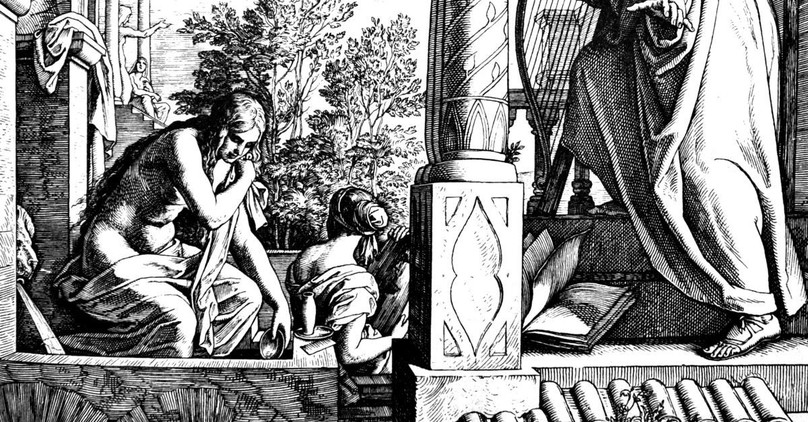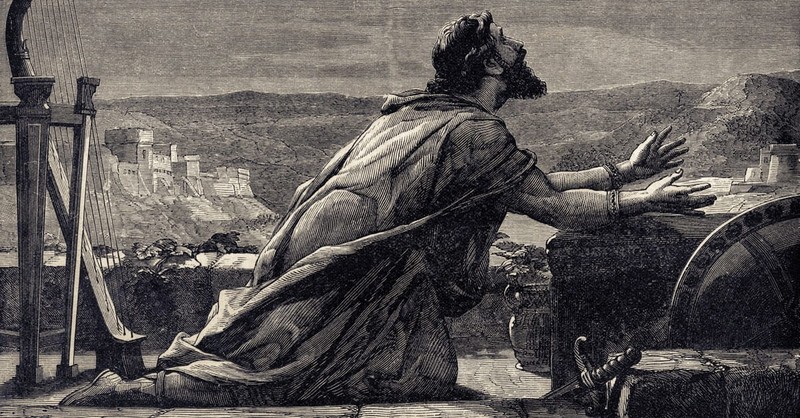
Who is Bathsheba? What is her story, do you know it? And what are the facts the Bible offers us about this woman?
Many of us, when hearing the name Bathsheba, recognize her as the beautiful woman mixed in a tangle of adultery with King David. We might also know her as the wife of the Hittite Uriah, the daughter of Eliam, or the mother of Israel’s King Solomon. These are all true connections; the facts of her life. They are part of Bathsheba’s story. But if we look deeper, we see much more threaded into this beautiful woman’s life.
Bathsheba’s story can be found in the Bible in 2 Samuel 11-12. Here are 7 facts you should know from the Bible’s story of Bathsheba.
Image Credit: Getty Images

1. Bathsheba experienced sin’s far-reaching impact.
The first decision to impact Bathsheba, which led to the terrible and deadly embroilment of sin, came from King David. He chose to remain home when kings typically go to war. By refusing to be present where duty called him, his eyes fell on a view that took him straight to sin’s door.
“At the return of the year, at the time when kings go out, David sent Joab, and his servants with him, and all Israel; and they destroyed the children of Ammon, and besieged Rabbah. But David stayed at Jerusalem.”(2 Samuel 11:1 WEB)
David watched Bathsheba while she bathed. Then went a step further: he inquired after the beautiful woman. Next, he requested her presence, and soon enough, he committed adultery with her. Bathsheba, the target of David’s temptation, became embroiled in sin. Imagine what would have happened had David gone to war instead.
Bathsheba found herself pregnant. A deceitful David attempted to cover the sin. He invited Uriah, Bathsheba’s husband, home for a time, hoping the man of great integrity would have relations with his wife. But Uriah, knowing his men, remained on the field and in battle conditions, refusing such luxury. As a result, David sinned further by penning instructions for Uriah’s “accidental” death on the battlefield.
Not only did Bathsheba feel the sting of adultery – some even speculate it was a forced relation – but she also found herself impacted by the subsequent death of her husband. Sin opened the door for havoc in the woman’s life.
Image Credit: Unsplash

2. Bathsheba found herself involved in a murder plot.
“In the morning, David wrote a letter to Joab, and sent it by the hand of Uriah. He wrote in the letter, saying, ‘Send Uriah to the forefront of the hottest battle, and retreat from him, that he may be struck, and die.’”(2 Sam. 11:14-15 WEB)
Bathsheba wasn’t the mastermind behind the plot. We don’t even know if she had knowledge about it, but the woman’s swollen belly caused David concern, and he pressed on in his attempts to hide the sin. As a result, Bathsheba found herself involved in a murder plot that eventually played out with her husband’s death.
Image Credit: spfdigital/Thinkstock

3. Bathsheba felt the impact of grief.
“When Uriah’s wife heard that Uriah her husband was dead, she mourned for her husband.” (2 Sam. 11:26 WEB)
“But when David saw that his servants were whispering together, David perceived that the child was dead; and David said to his servants, ‘Is the child dead?’ They said, ‘He is dead.’” (2 Sam. 12:19 WEB)
Many of us have felt the clutch of grief due to the loss of a loved one. It’s heavy, and boy, does it hurt. Bathsheba experienced the heaviness of grief as well—twice. She mourned for her husband, Uriah, as well as her child born from the adulterous affair with David. Both deaths occurred within a short timeframe. Most certainly, Bathsheba understood the clutch of grief.
Image Credit: Pexels

4. Bathsheba raised a king.
“And David comforted Bathsheba his wife, and went in unto her, and lay with her: and she bare a son, and he called his name Solomon: and the Lord loved him.” (2 Sam. 12:24 KJV)
Can you imagine what it would be like to raise a young man who will one day become king? This undoubtedly was on this new mother’s mind. After entering into marriage with David post-adultery, Bathsheba became pregnant a second time and gave birth to Solomon. Bathsheba became the mother of a future king, and God saw fit to redeem the story, extending his love toward the child, and eventually crowning this boy, Solomon, as king.

5. Bathsheba pressed David to keep his promise.
“She said to him, ‘My lord, you swore by Yahweh your God to your servant, “Assuredly Solomon your son shall reign after me, and he shall sit on my throne.” Now, behold, Adonijah reigns; and you, my lord the king, don’t know it. You, my lord the king, the eyes of all Israel are on you, that you should tell them who will sit on the throne of my lord the king after him. Otherwise it will happen, when my lord the king sleeps with his fathers, that I and my son Solomon will be considered criminals.’” (1 Kings 1:17-18, 20 WEB)
This passage allows us to see Bathsheba taking a risky step to support her child and his future. She pressed David to keep his word, even though another son of David’s had underhandedly claimed the title of kingship. Ultimately, God used Bathsheba’s bravery for His plan. David crowned Solomon king, and the rest is history.
Image Credit: Thinkstock

6. Bathsheba was surrounded by men who fell to women.
David held a weakness for women. After all, he committed adultery with Bathsheba. But the lure toward women didn’t stop there. It continued into the next generation with Bathsheba’s son.
Solomon, a man filled with wisdom from God, seemingly tossed this great gift aside when it came to women. He took many brides, seven hundred, as a matter of fact. And many of these wives were from foreign countries, people groups from which God warned Israel not to consider for marriage.
But Solomon, son of Bathsheba, did not honor God’s wishes. He married those women against God’s will. As a result, they dangerously drew his heart away from God Almighty and toward the emptiness and danger of their gods.
The Bible notes that Solomon was drawn to the other gods in his old age. Bathsheba was likely dead by that time, but the situation might cause us to wonder what she noticed when she was alive and how she felt about her son’s flirtation with danger due to his hunger for women.
Was she worried? Did she pray for her son? Did she have conversations with him or simply stand by and watch? The Bible isn’t clear, but the outcome remains crystal.
“Now king Solomon loved many foreign women, together with the daughter of Pharaoh, women of the Moabites, Ammonites, Edomites, Sidonians, and Hittites; of the nations concerning which Yahweh said to the children of Israel, “You shall not go among them, neither shall they come among you; for surely they will turn away your heart after their gods.” Solomon joined to these in love. He had seven hundred wives, princesses, and three hundred concubines; and his wives turned away his heart. When Solomon was old, his wives turned away his heart after other gods; and his heart was not perfect with Yahweh his God, as the heart of David his father was.” (1 Kings 11:1-4 WEB)
Image Credit: Lightstock

7. Hope springs from Bathsheba.
Sometimes folks consider Christians clean and squeaky. But if we view the lineage of Jesus, we see imperfect people claiming their spots in this miraculous ancestry of hope. Murder and adultery, from the story of Bathsheba and King David, sit in this line. Yet God threaded hope into the end of the line with Jesus.
“The book of the genealogy of Jesus Christ, the son of David, the son of Abraham.
Jesse became the father of King David. David became the father of Solomon by her who had been Uriah’s wife.” (Matthew 1:1,6 WEB)
All Christians can find hope in Jesus. It doesn’t matter how far we’ve strayed or what sins we’ve committed. Everyone is pardonable when we believe in and rely on the Lord for forgiveness. He takes the messy and makes something stunning and hopeful from its threads. With the beauty of this hope impacting our lives and history, we share in the redemption of Bathsheba’s story as well.
 Kristi Woods, writer and speaker, is passionate about women walking deeper with God. She writes regularly and offers faith-building tools at www.KristiWoods.net. She contributes monthly at iBelieve.com and Crosswalk.com and is published in three Chicken Soup for the Soulpublications. Kristi, her husband, and their three children survived a nomadic, military lifestyle, and have set roots in Oklahoma. Connect with Kristi here: Facebook and Pinterest.
Kristi Woods, writer and speaker, is passionate about women walking deeper with God. She writes regularly and offers faith-building tools at www.KristiWoods.net. She contributes monthly at iBelieve.com and Crosswalk.com and is published in three Chicken Soup for the Soulpublications. Kristi, her husband, and their three children survived a nomadic, military lifestyle, and have set roots in Oklahoma. Connect with Kristi here: Facebook and Pinterest.
Image Credit: Lightstock
Originally published Friday, 22 March 2019.



